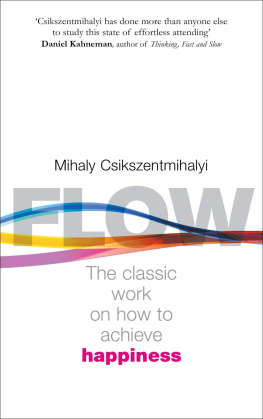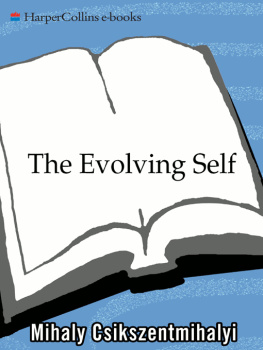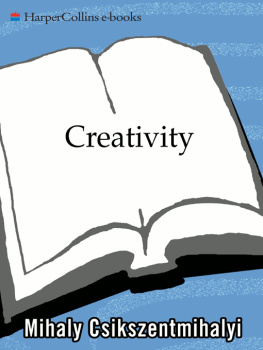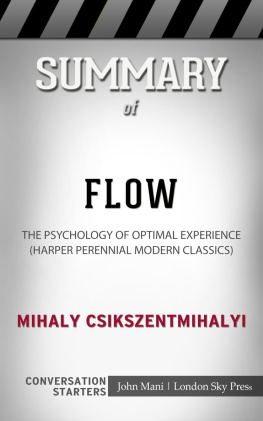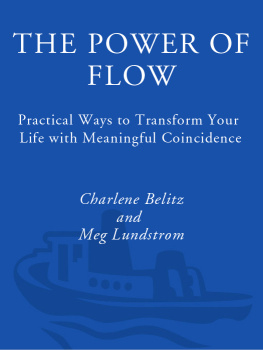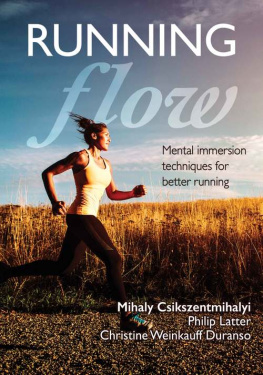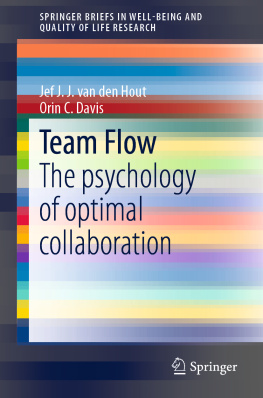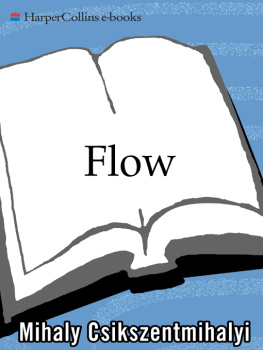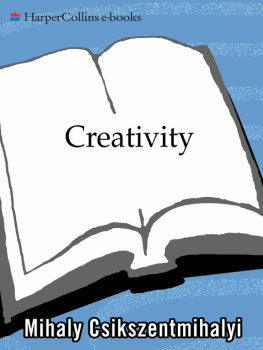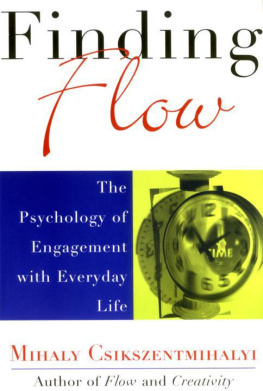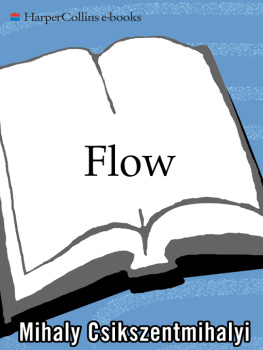CONTENTS
ABOUT THE BOOK
What really makes people glad to be alive? What are the inner experiences that make life worthwhile?
This classic work on happiness presents the general principles that have enabled real people to transform boring and meaningless lives into ones full of enjoyment. It introduces the phenomenon of flow a state of joy, creativity and total involvement, in which problems seem to disappear and there is an exhilarating feeling of transcendence.
Drawing upon extensive research, Mihaly Csikszentmihalyi explains how this pleasurable state can be brought about by all of us and not just left to chance. We each have the potential to experience flow, whether at work, at play or in our relationships. Through understanding the concept of flow, we can learn how to live in harmony with ourselves, our society and, ultimately, with the greater universe. We can return to the state of happiness that is our natural birthright.
ABOUT THE AUTHOR
M IHALY C SIKSZENTMIHALYI is professor and former chairman of the Department of Psychology at the University of Chicago. For the past twenty years he has been involved in research on topics related to flow. Funding for these studies has come from the Public Health Service and various private grants, primarily the Spencer Foundation. In addition, a great deal of interest in his work has been building outside academia, spearheaded by substantial articles in Psychology Today, the New York Times, the Washington Post, the Chicago Tribune, Omni, Newsweek, and elsewhere. He is the author of Beyond Boredom and Anxiety, and co-author of The Creative Vision, The Meaning of Things, and Being Adolescent.
Dr. Csikszentmihalyi is a member of the National Academy of Education and National Academy of Leisure Sciences. He has been a Senior Fulbright Fellow and currently sits on several boards, including the Board of Advisers for the Encyclopaedia Britannica. He has appeared on a number of foreign television networks, such as the BBC and RAI (Italian television), and has taken part in several hourlong segments of Nova.
Flow
The Classic Work on How to Achieve Happiness
Mihaly Csikszentmihalyi

For Isabella, and Mark and Christopher
Authors Note
Flow first appeared in the United States in 1990. For several years before that time, people had been urging me to collect the research that I had published in obscure academic journals, and to make it available to a wider readership. I finally heeded the advice and discovered in the process that writing for a lay audience was much more fun (as well as more difficult) than writing for fellow scholars. But even as I enjoyed writing this book, I never dreamt of the impact it would have in the dozen years since its appearance. For instance, so far Flow has been translated into 14 different languages, including Serbian, Portuguese, Japanese, and Chinese; a Korean translation is also being prepared. It was adopted by four book clubs in the US and more elsewhere. A great many readers from around the world have written letters containing eloquent accounts of how they have used the book to improve the quality of their own lives. In addition, the ideas contained in this book have found their way into a variety of applications, ranging from politics to education; from psychiatric hospitals to the Cirque de Soleil; from the manufacture of automobiles at Nissan and Volvo to the design of art museums.
Clearly, Flow has touched a nerve in the collective psyche. For too long psychology had been focused almost exclusively on the shadows of human existence. The behavior of men and women was seen as determined by biological inheritance and by outside forces, twisted by frustrated desire. Scant attention was paid to what makes life bearable, enjoyable, free. Into this near vacuum Flow brought a flicker of light, a message that life can be an exciting, enjoyable and creative adventure.
With each passing decade this message becomes more and more relevant. For, as esoteric technologies proliferate and increasing powers of creation and destruction fall into the hands of our species, the responsibility for using such powers wisely is becoming ever more urgent. Are we going to exhaust the resources of the planet heedlessly while we could have a much more fulfilling life with less waste? Is greed going to split humanity into the obscenely rich and the abysmally poor, fuelling irreparable social conflicts? And, as we move into the age of genetic engineering, what kind of human beings are we going to create? Blood and flesh copies of our machines and computers? Or individuals with a consciousness open to the cosmos, organisms that are joyfully evolving in unprecedented directions? These are not questions that Flow deals with directly, but its description of the principles of a fulfilled lifeone full of enjoyment and constantly growing in complexitysuggests ways to prepare ourselves for the difficult choices that tomorrow will bring. But whatever its usefulness for confronting the future might be, I hope reading this book will be its own reward, here and now.
Mihaly Csikszentmihalyi
Claremont, California
PREFACE
This book summarizes, for a general audience, decades of research on the positive aspects of human experiencejoy, creativity, the process of total involvement with life I call flow. To take this step is somewhat dangerous, because as soon as one strays from the stylized constraints of academic prose, it is easy to become careless or overly enthusiastic about such a topic. What follows, however, is not a popular book that gives insider tips about how to be happy. To do so would be impossible in any case, since a joyful life is an individual creation that cannot be copied from a recipe. This book tries instead to present general principles, along with concrete examples of how some people have used these principles, to transform boring and meaningless lives into ones full of enjoyment. There is no promise of easy short-cuts in these pages. But for readers who care about such things, there should be enough information to make possible the transition from theory to practice.
In order to make the book as direct and user-friendly as possible, I have avoided footnotes, references, and other tools scholars usually employ in their technical writing. I have tried to present the results of psychological research, and the ideas derived from the interpretation of such research, in a way that any educated reader can evaluate and apply to his or her own life, regardless of specialized background knowledge.
However, for those readers who are curious enough to pursue the scholarly sources on which my conclusions are based, I have included extensive notes at the end of the volume. They are not keyed to specific references, but to the page in the text where a given issue is discussed. For example, happiness is mentioned on the very first page. The reader interested in knowing what works I base my assertions on can turn to the section at the back of the book and, by looking under the linked reference, find a lead to Aristotles view of happiness as well as to contemporary research on this topic, with the appropriate citations. The notes can be read as a second, highly compressed, and more technical shadow version of the original text.
At the beginning of any book, it is appropriate to acknowledge those who have influenced its development. In the present case this is impossible, since the list of names would have to be almost as long as the book itself. However, I owe special gratitude to a few people, whom I wish to take this opportunity to thank. First of all, Isabella, who as wife and friend has enriched my life for over twenty-five years, and whose editorial judgment has helped shape this work. Mark and Christopher, our sons, from whom I have learned perhaps as much as they have learned from me. Jacob Getzels, my once and future mentor. Among friends and colleagues I should like to single out Donald Campbell, Howard Gardner, Jean Hamilton, Philip Hefner, Hiroaki Imamura, David Kipper, Doug Kleiber, George Klein, Fausto Massimini, Elisabeth Noelle-Neumann, Jerome Singer, James Stigler, and Brian Sutton-Smithall of whom, in one way or another, have been generous with their help, inspiration, or encouragement.
Next page
